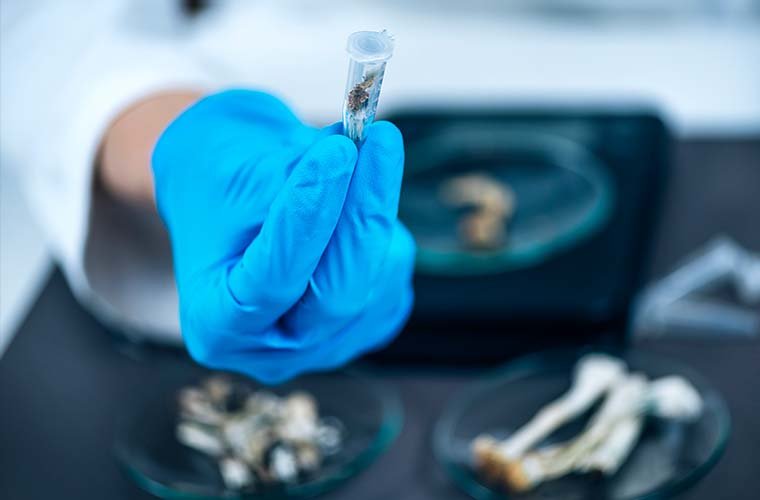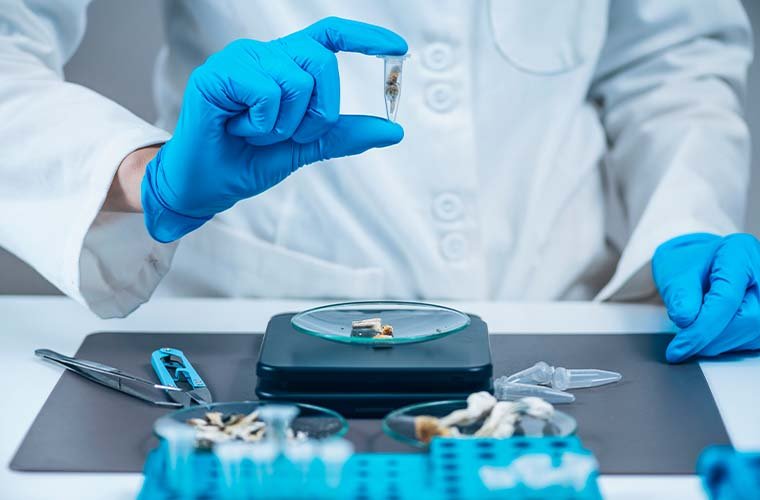In a study published in the Journal of Psychopharmacology, researchers found that psychedelic therapy involving controlled microdosing of the drug psilocybin failed to relieve symptoms associated with anxiety or depression.
Results of the placebo-controlled study cast doubt on the claimed benefits of psilocybin microdosing. However, study co-author and current Ph.D. candidate at the University of Konstanz, George Fejer, says the negligible impact of microdosing does not mean psychedelic therapy should be dismissed.
Instead, past research suggests dosage, or more importantly, the subjective “mystical experience” brought on by altered states of consciousness, could be vital in unlocking the therapeutic potential of psychedelics.
“The consensus [is] you need the subjective effects, or the altered states of consciousness, to get the full and enduring benefits from these drugs,” said Fejer in an interview with The Debrief. “These effects are quite dose-specific, and I think that it is a disadvantage of microdosing that it does not aim to facilitate explicit changes in subjective experience.


Psychedelics have had a major impact on Cognitive Science
In the United States, psychedelic drugs, such as psilocybin and lysergic acid diethylamide (LSD), are considered Schedule I Controlled Substances, meaning the compounds possess “significant potential for abuse and dependence” and “no recognized medicinal value.”
In light of their current legal status, Fejer points out that psychedelics have played a significant role in cognitive science and in furthering our understanding of human consciousness.
“I think the biggest impact of psychedelics on the study of consciousness took place in the 1960s by introducing the idea that complex behaviors are subject to chemical events that take place in the brain,” said Fejer. “These insights are ubiquitous nowadays, but they used to be unheard of in the field of psychiatry.
“The discovery of LSD demonstrated that tiny chemical interventions can cause profound changes to our mental state, and psychiatrists re-evaluated the foundations of mental disease. Research on LSD also led to discovering the role of serotonin in the brain, and many other neurotransmitters, such as glutamate, adrenaline, and dopamine.”
The discovery that complex behaviors result from chemical changes in the brain helped establish the field of consciousness research, a discipline Fejer says wasn’t taken seriously until the mid-1990s.
“The term consciousness or any other subjective experiences were considered too wishy-washy to be studied scientifically, and even fields
like emotion research suffered from the stigma,” explained Fejer.
Now, consciousness study is accepted as a serious field, and in recent years, interest in the therapeutic potential of psychedelics has become an ever-increasing area of clinical research.
In 2018, the U.S. Federal Drug Administration began granting “Breakthrough Therapy” designation to various research institutes, allowing for the study of psilocybin as a possible therapeutic for significant mood disorders.
Subsequently, several studies have come out in recent years, showing a positive relationship between psychedelics and improved mental health. Research has additionally failed to find any evidence for adverse short-term or long-term effects from engaging in psychedelic therapy.


Psychedelic Therapy Without the Trip
In the last decade, the concept of microdosing- or ingestion of 5-10% of the standard dose of a psychedelic substance -has become a buzzword in psychedelic therapy research. With microdosing, doses are sufficiently low so as not to produce the hallucinogenic effects typically associated with psychedelics.
Several observational studies have claimed profound mental health benefits associated with psychedelic microdosing. For example, one international study published in 2020 found that nearly 80% of participants reported psilocybin microdosing had improved symptoms of depression and anxiety.
However, the most significant limitation to scientifically proving the effectiveness of microdosing stems from the bulk of previous studies having to rely on anecdotal reporting and a lack of placebo control groups.
By contrast, in this recent study, researchers from the University of Amsterdam, Leiden University, and Prague University of Chemistry and Technology performed a double-blind experiment whereby participants were given doses of either psilocybin or placebo pills.
After a strict, 8-week microdosing schedule, participants completed a battery of tests designed to measure depression, anxiety, emotion processing, and interoceptive awareness.
Upon analysis, researchers found no statistically significant difference between psilocybin and placebo groups and users’ symptoms of depression or anxiety.
Interestingly, researchers did note a strong generic placebo effect, showing both the microdosing and placebo groups had significant changes in their overall wellbeing after beginning the study.
“Thus, merely expecting that you are part of a clinical trial during which you might or might not receive a psychoactive substance already improves your wellbeing,” study author Michiel van Elk, an associate professor of cognitive psychology at Leiden University, told Psypost.
The study’s findings coincide with another 2016 placebo-controlled study by researchers from John Hopkins and New York University, which demonstrated that low doses of psilocybin failed to reduce depression and anxiety in patients facing life-threatening cancer.
Interestingly, the same study did find that high doses of psilocybin substantially eased symptoms of depression and anxiety and improved the general quality of life in terminal cancer patients. Six months after taking high doses of psilocybin, researchers found that 80% of patients still demonstrated sustained improvements in overall mental health.
“This makes intuitive sense because the subjective experience provides a lot of material for the patient and the therapist to build a therapeutic alliance. The neurochemical interactions are, of course, a necessary component of their effects because they facilitate altered states of consciousness,” said Fejer.
“These effects are quite dose-specific, and I think that it is a disadvantage of microdosing that it does not aim to facilitate explicit changes in subjective experience. Even if we only consider the neurochemical interactions, I think larger doses are more likely to yield positive effects, in which case the experience is a very important therapeutic modality to work with.”


The Mystical Experience Is Key
“There is a real risk in promoting the idea that repeated microdosing can yield the same type of benefits as larger doses because different doses evoke different kinds of neurochemical effects,” says Fejer.
However, this doesn’t mean microdosing should be entirely written off. At least not yet.
“Research often looks at whether psychedelics improve mental health outcomes by inducing mystical-type experiences. Since microdosing does not induce these types of experiences, it is not surprising that they do not yield the same effects,” explains Fejer.
“Research on these issues is still in its infancy, and I think it would be a good idea to look at the advantages of minidoses in terms of tailoring therapy to the needs of patients.”
Considering that the majority of research suggests altered states of consciousness play such a vital role, Fejer still has doubts that microdosing will ever prove to be an effective option for psychedelic therapy. However, Fejer, who also serves as a team coordinator for ALIUS – a French-based interdisciplinary group that focuses on consciousness research- says he’s happy to have his opinion on microdosing proven wrong.
“I am a little bit skeptical about microdosing since I do not think that the current evidence supports the claims of microdosing enthusiasts,” said Fejer. “However, I am also open to seeing contradicting evidence, and this applies to our study as well: null results are merely an invitation for other researchers to come up with better experiments and better measurements!”
Tim McMillan is a retired law enforcement executive, investigative reporter and co-founder of The Debrief. His writing covers defense, national security, and the Intelligence Community. You can follow Tim on Twitter: @LtTimMcMillan. Tim can also be reached by email: tim@thedebrief.org or through encrypted email: LtTimMcMillan@protonmail.com.

